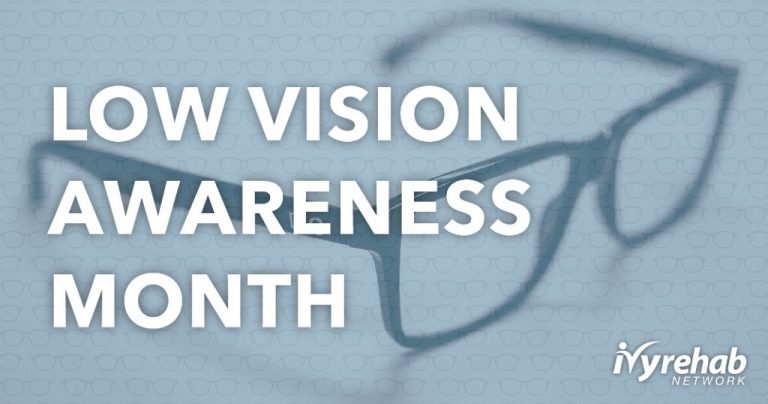
February is Low Vision Awareness Month
February is Low Vision Awareness Month! Did you know? Currently, 4.2 million Americans ages 40 and older are visually impaired? By 2030, when the last baby boomers turn 65, this number is projected to reach 7.2 million, with 5 million having low vision. Ivy Rehab Occupational Therapists can work with you or someone you love on a variety of vision conditions that impact daily life. We strive to help those with low or impaired vision live productive and satisfying lives as independently and safely as possible.
Common Difficulties Caused by Vision Impairment
- Reading
- Cooking
- Identifying items
- Writing
- Watching TV
How An Occupational Therapist Can Help With Low Vision
Low vision conditions may include but are not limited to glaucoma, macular degeneration, and diabetic retinopathy. Ivy Rehab’s Occupational Therapists can help you determine what low vision modifications can be recommended. For example, an OT might restructure a task to remove a vision-dependent step, such as programming a telephone to speed dial emergency numbers.
When kitchen safety is a concern for someone with low vision, an OT may recommend adding lighting to certain areas of the space. Reorganizing the kitchen can increase ease of accessibility and safety when preparing meals, and simply removing a hazard can reduce the risk of falls. Ivy’s Occupational Therapists work to help individuals with their remaining vision as efficiently as possible.
If you are seeking vision rehabilitation please do not hesitate to contact us to schedule an appointment for an evaluation. Your vision and safety are important!
Article Reviewed by Holly Lookabaugh-Deur, PT, DSc, GCS, CEEAA
Holly Lookabaugh-Deur, PT, DSc, GCS, CEEAA is a practicing physical therapist and a partner and Director of Clinical Services at Ivy Rehab Network. Deur is board certified as a geriatric clinical specialist and certified exercise expert for aging adults with more than 35 years of clinical experience. She is certified as an aquatic and oncology rehabilitation specialist and serves as adjunct faculty at Central Michigan University and Grand Valley State University.
The medical information contained herein is provided as an information resource only, and does not substitute professional medical advice or consultation with healthcare professionals. This information is not intended to be patient education, does not create any patient-provider relationship, and should not be used as a substitute for professional diagnosis, treatment or medical advice. Please consult with your healthcare provider before making any healthcare decisions or for guidance about a specific medical condition. If you think you have a medical emergency, call your doctor or 911 immediately. IvyRehab Network, Inc. disclaims any and all responsibility, and shall have no liability, for any damages, loss, injury or liability whatsoever suffered as a result of your reliance on the information contained herein.